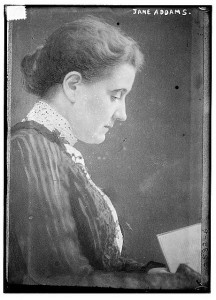In the wake of Super Tuesday and with all the fuss about the presidential election, I was wondering: What would Jane Addams think about our latest crop of presidential candidates and the political system we have in general? Well, we can’t really know since she died in 1935, but thanks to her prolific writing we do know what she valued in the political system. As always, her focus was on the people, not the ones in power. She had little patience for politicians who put their own interests and beliefs above those of the people they served, especially on the city level. However, she was also extremely critical of elected officials who pander too much to their constituents and put them before humanity as a whole. In short, Addams wanted a politician who could achieve a balance between caring about the people they served and being able to look towards effecting change on a much grander scale.
Finding someone who fits this definition is not easy. After all, Tammany Hall may have been corrupt and self-interested, but also offered tangible help to their constituents. Was it any surprise then that they stayed in power so long? Addams argued that “the successful candidate…must be a good man according to the morality of his constituents” (Democracy and Social Ethics, 229). She was right then and her words ring true today as well. Today we see over and over again elected officials who focus exclusively on their most loyal groups, often to the exclusions and detriment of other groups, be they religious, racial, or socioeconomic. This is not a good way to run the most powerful country in the world. Placing the whims and needs of a few over those of the whole is selfish and makes any kind of progress for the good of the whole extremely difficult, but is also the simplest way to get elected.
The thing Addams criticized most in elected officials was their machinations and manipulations. She despised how they used events- sad and happy- to convince people to vote for them. She also disliked when officials bribed people, especially when they did it subtly enough that their constituents didn’t realize what was happening. Addams strongly looks down on manipulating situations because “many a man…has formulated a lenient judgement of political corruption” (Dem & S.E., 239) She spoke primarily about more local officials, but arguably it can be applied to the national level as well, especially when one considers the role of backers and endorsements. The system is corrupt and works not for the good of the people, but for the good of those in charge. This arguably is one reason why there is so much opposition and difference in modern American politics. Neither of the parties in American politics put the people before the big funders and any attempts to make meaningful reform are blocked as quickly as possible to prevent up setting the donors. Therefore, the system is continually chasing its own tail and cannot actually accomplish anything.
setting the donors. Therefore, the system is continually chasing its own tail and cannot actually accomplish anything.
So what would this election mean to Addams? Truthfully, she most likely wouldn’t like any of the candidates. Her policies are more in line with Bernie Sanders than with Donald Trump, however, in her day she challenged all the elected officials and demanded that they improve and pay more attention to the needs of the people and I see no reason why she would change her opinion today. Addams was certainly a woman who knew her own mind and had no interest in keeping those opinions under wraps, at least not where the rights of the poor were concerned, and she wielded the influence she had to create change. That doesn’t strike me as the kind of woman who would sit this election out and just quietly support a candidate, but rather a woman who would use the influence she wielded to force all candidates to listen to her.
All I can say is #JaneAddamsForPresident2k16
Margaret Szydlik: The Publicity Assistant for the project, she is expected to graduate with a BA in History, with minors in French and Anthropology in May 2017. Her job is focused on the social media associated with the project, updating and maintaining the blog, and garnering public interest in the project, though she is also involved in the transcription of the documents. She can be contacted at mszydlik@ramapo.edu.


